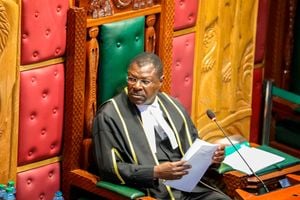Patience Mshenga, first Duruma female professor now nurses ambition to head university

The Dean of the Faculty of Agriculture at Egerton University, Prof Patience Mshenga, the first woman professor from the Duruma community, shows some of the trophies of her faculty during the interview on April 9, 2024.
When the history of the Duruma community is finally written, there will be no greater heroine in the collective tale than Prof Patience Mlongo Mshenga.
And that would be for a good reason. In 2021, Mshenga became the first female professor from the community. She is also the first Duruma woman to earn a doctorate.
Duruma is one of the Miji Kenda – “Nine Tribes – of coastal Kenya.
Prof Mshenga has broken many glass ceilings and cultural barriers.
She was awarded the Nation Media Group – Aga Khan Award – for being the top girl in the 1985 Kenya Certificate of Primary Education (KCPE) examination in Kwale District, now Kwale County.
The Marketing Society of Kenya honoured her for being the best Master of Business Administration (MBA) Marketing Option student at the University of Nairobi for year 2000.
After becoming a full professor, she was named Faculty of Agriculture Dean at Egerton University.
Since its inception in 1939 as Kenya’s premier Agricultural college, before it was upgraded to a university in 1987, Egerton’s Faculty of Agriculture had never had a woman dean.
Mshenga is a professor of Agribusiness Management, specialising in agribusiness development and youth employment.
University professor
How does it feel to be the first female university professor from a small community?
“It is indeed humbling. I felt a sense of responsibility for the first time. I actually felt good being referred to as a professor and what I could do for the Duruma, Kenya and Africa in general,” she said.
Prof Mshenga grew up in Mwangani village, Kinango sub-county. She attended Mgandini Primary School and was later admitted to Moi High School Kabarak, Nakuru County.
She joined Egerton University where she earned a Bachelor of Agribusiness Management degree.
After her undergraduate studies, she was retained as part of the programme for employee development. She was hired as a teaching assistant in the Department of Agricultural Economics and Agribusiness Management.
She later earned a Master of Business Administration (MBA) degree from the University of Nairobi and a PhD in Agribusiness Management at Egerton University.
The doctorate was sponsored by the Regional Universities Forum for Capacity Building in Agriculture.
While growing up in the village, education for girls was not a priority.
“My father, Ronald Mshenga, was derided by villagers for ‘wasting’ money educating six girls instead of marrying them off,” she recalls.
“They used to tell him that a highly-educated girl would have trouble finding a man to marry but my father did not change his stand. He remained committed to the saying attributed to Ghanaian scholar James Emmanuel Kwegyir-Aggrey who said ‘if you educate a man, you educate an individual, but if you educate a woman you educate a family and nation.”
Prof Mshenga is the fourth born in a family of seven – six girls and a boy.
She says millions of girls in Kenya are suffering in silence as they miss out on education.
“Addressing the many challenges women face will take a long time. Fortunately, there have been improvements in awareness in the last five years. There are positive changes, though gender imbalance is still pronounced,” she says.
“We need to encourage more women to have a family life, children and a career. There should be diversity across all areas.”
Prof Mshenga says Agriculture was not her dream and only settled on the course at the time of joining the university.
Dental surgery
“I wanted to study dental surgery but I scored a B+ in Kenya Certificate of Secondary Education (KCSE) examination,” she says.
From 2010, Prof Mshenga has supervised more than 35 master’s degree students, six doctoral fellows and thousands of undergraduates.
The mother of a 16-year-old girl says the biggest challenge has been juggling between being a mother, wife and university lecturer.
“Balancing motherhood and career is tough. The biological and career clocks are always in conflict. I must always juggle work and family. There is the guilt of missing precious moments and the pursuit of work-life balance,” Prof Mshenga says.
Has she reached the pinnacle of her career? Absolutely not. Prof Mshenga says she is still ambitious and hopes to become a university Deputy VC and even chancellor.
What makes Prof Mshenga proud is seeing her students working for international organisations like the UN Food and Agricultural Organisation, the World Bank and the International Centre of Insect Physiology and Ecology.
Some have registered companies, creating jobs for themselves and others.
She says agriculture will be transformed when young farmers access finance and embrace modern technology.
“Agriculture has the most opportunities in all the value chains, including in research. If few students enrol for agriculture courses in universities and colleges, the country will not have enough manpower to replace retiring officers and sustain agri-food system,” she says.
She is happy with the fact that the Gen Z has launched the Kenya Agricultural Student Association.
“This a milestone. It shows commitment by university and college students to making good use of their training and fostering innovation in the field to produce quality and safe food,” she says.





